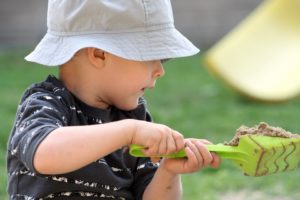 As infants become toddlers, children begin the process of individuating or separating from their parents. This process, which starts around 15 months, continues through the teenage years and is critical for a child to eventually develop her own identity, will and individuality. Individuation is the process of becoming aware of oneself, leading to an understanding of the difference between oneself and others. Since a toddler’s first “other” is you, her parent, basically, individuation is the development of a child’s understanding that her needs and wants are separate from yours.
As infants become toddlers, children begin the process of individuating or separating from their parents. This process, which starts around 15 months, continues through the teenage years and is critical for a child to eventually develop her own identity, will and individuality. Individuation is the process of becoming aware of oneself, leading to an understanding of the difference between oneself and others. Since a toddler’s first “other” is you, her parent, basically, individuation is the development of a child’s understanding that her needs and wants are separate from yours.
As a therapist, I think one of the main tenants of parenting is to give children tools to ultimately develop their own identity. Individuation as a toddler is the first step on this long journey and ultimately allows a child to recognize that not only can she separate from her parents but that her parents will love her unconditionally, no matter if parents agree with her decision to draw a purple sky not a pink one.
As parents, how to we support individuation? As children begin to exert their will (read: temper tantrums) and state specific preferences, parents often struggle with how to set appropriate limits. Since this process can strain a parents’ patience, it is easy to forget that the process of individuation is one of the greatest emotional developments children go through. When a child wades through this process, she is learning to have a strong sense-of-self. As children gain more independence from their parents regarding decision making, children are learning about their likes and dislikes. Learning to recognize these personal preferences allows a child to develop the beginnings of self-confidence.
How can we help?
- It can be confusing to a child to recognize she feels differently from her parents but you can support her in the individuation process. For example, if on a Sunday morning you plan an outing to the park but she balks, lying like spaghetti on the floor and screaming, “No, I want to stay here and color”, identify this, allow her to assert her preference and praise that decision. “Olivia, it looks like you want to color. Last week, you drew me so many pictures of the sky—you have really loved coloring recently. When you are finished, I will hang this picture on the fridge.” (Of course, if the temper tantrum comes before a planned event like a visit to grandparents, you can’t always be flexible and you can explain that to your child as well). This teaches your child in even the smallest way that you recognize her preferences and are supporting her, even if you can’t reroute your entire day. When a child feels that, she is able to make more and more personal choices.
- If a parent is critical of her child’s playtime choices (and later bigger ones), the child begins to rely on her parents to determine what is right for her. If you notice yourself constantly steering your child’s small choices (the swings not the sandbox) more than feels comfortable for you, stop for a minute and think about what it would feel like to be less directive. Allowing a child to make even these small decisions for herself can lead to a vast difference in a child’s belief that she can make the right decision!
- Emotional developments in young children are sometimes far less celebrated by parents than first steps or first words. The first little fit that turns into a hysterical tantrum is likely to leave both child and parent exhausted and overwhelmed. As inopportune as your no-longer-a-baby’s tantrum is (sitting in a restaurant you swear typically only had other crying kids until today), this fiery protest is the beginning of the process of individuation.
- Children who individuate from their parents have less anxiety about making life choices as teenagers and young adults. Children who can recognize their desires at a young age (like the crayons example above) develop self-confidence. It might not seem that these decisions are crucial, but choosing playtime activities is akin to a teenager choosing a college or a college freshman choosing a major. All of these decisions are building blocks that create a foundation for a child to trust her choices as an adult.
- Individuation is important for teenagers as well! The process actually looks similar — just on a much larger scale. It can be hard for parents when teenagers begin expressing preferences that may be quite different from what a parent pictured for them (artist over business school, a gap year), but those individual choices are critical for them to become healthy, functional adults.















